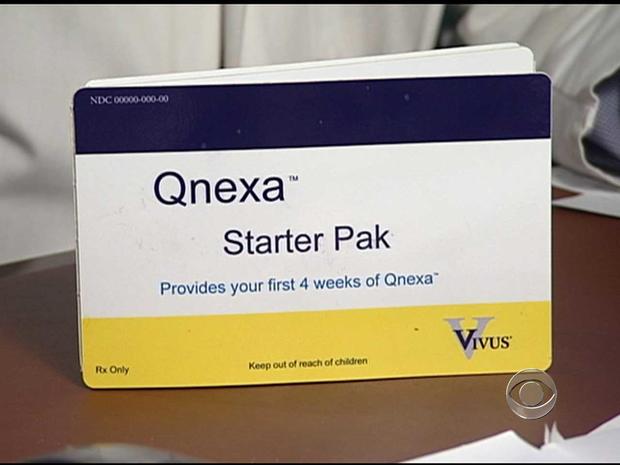Qnexa and the FDA: Why safe diet drugs are hard to come by
(CBS/AP) Drugmakers have been trying to battle obesity for as long as Americans have been packing on the pounds. But they've lost as many battles as those trying to lose weight.
PICTURES - 8 little mistakes that bring big weight gain
For nearly a century, scientists have struggled to make a diet pill that helps people lose weight without side effects that range from embarrassing digestive issues to dangerous heart problems.
This week, federal health advisers endorsed the weight loss pill Qnexa, even though the FDA previously rejected it over concerns that it can cause heart palpitations and birth defects if taken by pregnant women.
The vote raises hopes that the U.S. could approve its first anti-obesity drug in more than a decade. It also highlights how challenging it is to create a pill that fights fat in a variety of people without negative side effects.
FDA panel backs obesity pill Qnexa: What happens next?
FDA panel backs weight loss drug, despite risks
"Having a drug for obesity would be like telling me you had a drug for the fever," Dr. Mitchell Roslin, chief of bariatric surgery at Northern Westchester Hospital in New York, said. "There can be millions of different reasons why someone is obese; it's really a symptom of various underlying mechanisms."
An effective and safe diet pill would be an easy sale in the U.S. The country has over 75 million obese adults - nearly 35 percent of the population. But the biggest problem in creating a weight-loss drug is that there's no safe way to turn off one of the human body's most fundamental orders.
For millions of years, humans have been programmed to consume calories and store them as energy - that is, fat. It's this biological mechanism that makes it almost impossible to quickly lose weight by not eating. Cutting down on food instead sends stronger signals to the body to store more calories.
"Throughout most of human history calories were scarce and hard to get, so we have numerous natural defenses against starvation," Dr. David Katz of Yale University's Prevention Research Center said. "We have no defenses against overeating because we never needed them before."
Previous attempts to create a weight loss drug have failed - and many have proved fatal.
In the 1930s, for example, doctors focused on speeding up metabolism to burn more calories. So they prescribed a chemical called dinitrophenol, which accelerated metabolism, but also caused fever, swelling and deadly toxicity in some patients. The FDA was later established in response to untested drugs like dinitrophenol.
In the `50s and `60s, amphetamines became a popular weight loss treatment because they boost metabolism and suppress appetite. But the pills proved to be highly addictive, and doctors discovered they increase blood pressure and heart rate. The amphetamine phentermine remains approved for short-term weight loss, usually less than 12 weeks, though it is seldom prescribed because of the potential for addiction.
Perhaps the worst diet pill safety debacle came in the 1990s and involved the combination of phentermine and another weight loss drug marketed by Wyeth called fenfluramine. The combination of the two pills, dubbed fen-phen, was never approved by the FDA but more than 18 million prescriptions were written for it by the mid-90s.
But after studies in 1997 suggested that up to a third of patients taking fen-phen experienced heart valve damage, Wyeth was forced to recall two versions of fenfluramine and eventually paid more than $13 billion to settle tens of thousands of personal injury lawsuits.
Currently, the only drug approved for long-term weight loss in the U.S. is orlistat, which is sold as the prescription drug Xenical and over the counter as alli. The drug works by blocking the absorption of fat. But it hasn't gained traction because it has unpleasant side effects, including loose bowel movements. Educational pamphlets for alli even recommend people start the program when they have a few days off work, or bring an extra pair of pants to the office.
Vivus' Qnexa is one of a trio of drugs seeking FDA approval. It's a combination of amphetamine phentermine, which suppresses appetite, and topiramate, which is supposed to make patients feel more full. FDA doctors voted 20-2 in favor of the drug.
The group touted the drug's benefits, which include weight loss of nearly 10 percent for most patients taking the drug over a year - the highest reduction reported with any recent diet pill. But panelists stressed that the drugmaker must be required to conduct a large, follow-up study of the pill's effects on the heart.
The FDA is expected to issue its decision on Qnexa by mid-April.
"The potential benefits of this medication seem to trump the side effects," said FDA panel member Dr. Kenneth Burman of the Washington Hospital Center in Washington DC. "But in truth, only time will tell."

